Welcome! For a lot of gamers out there, we might not have a large group of people that we can play with on a regular basis. For many of us, our main gaming partners are our significant others or our children or our roommates or a co-worker or… well, you get the drift. Whatever the case may be, often times we find ourselves sitting across the table with just one other person with nothing to do. In this series of articles, I will be turning my focus on some great 2-player only games that can fill that void!
Overview
In today’s spotlight, we’ll be setting our sights on Babel. Babel is a two-player game about building up, tearing down, and defending temples. Each player has a hand of cards and a building pawn. Using the cards in their hands, the players will vie to move their pawn from building location to building location in an effort to construct the most temples while hampering their opponent’s efforts to do the same until a specific victory condition is achieved and a winner emerges.
Components
There’s really not a lot to this game as far as components go. Inside of the box you’ll find the game board, a very well thought out and illustrated rulebook, one deck of Temple cards, a deck of Nation cards divided into 5 different nations (Assyrians, Hittites, Medes, Persians, and Sumerians), and 2 building pawns (one brown, one tan).
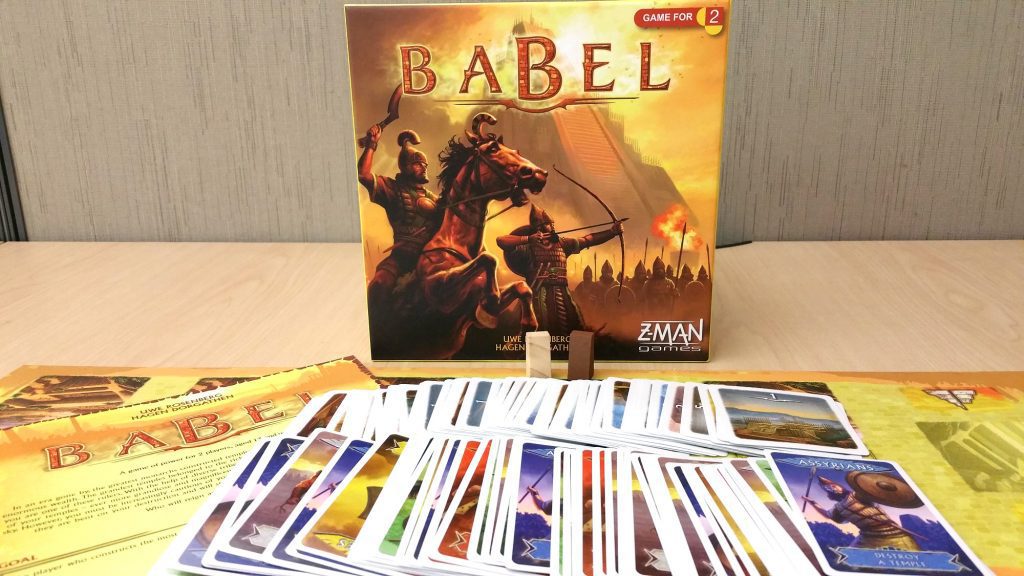
The components are all of fairly decent quality. The box is nice and sturdy. The cardstock is thick and durable. The game board’s nice and thick as well. As far as the component quality goes, I don’t have many complaints, but I do have a few. Firstly, I wish the cards had a nice linen finish on them. Even though they’re not flimsy, you’ll be handling them a lot and the linen finish makes it easier to pick them up and shuffle them around. Secondly, due to its tri-fold nature, the game board does bulge upwards slightly along one of the folds. It’s not too distracting, but if you’re a perfectionist, it’s going to drive you nuts that it isn’t sitting perfectly flat. And, speaking of the game board, my very last complaint is that the gameboard fits perfectly into the box so it is a very tight fit. You’d better grow out your fingernails if you don’t want to have to struggle to get the game board out of the box!
Setup
The setup for Babel’s not too complicated. First, select a start player. Then each player selects a color. The game board is laid out between the two players and they will place their building pawns onto the Temple space on their side of the board. Next, two level 1 Temple cards are removed from the Temple card deck and each player receives one of these (more on Temple cards later!). The remaining Temple cards are shuffled into a deck and placed face down onto the Temple space between the building pawns. Finally, the Nation card deck is shuffled and placed face down nearby and each player draws a hand of starting cards. The start player draws 3 and the second player draws 5. You’re now ready to begin.
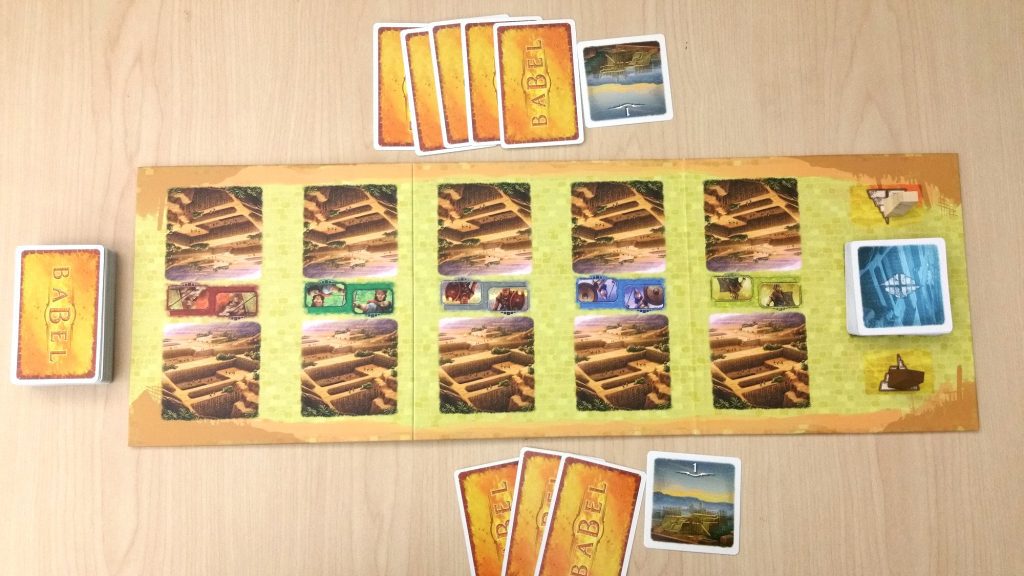
The Temple Cards
The Temple cards range in value from 1 to 6. When a temple is constructed, the player will typically begin with a level 1 temple (some of the Nation cards can circumvent this and we’ll get to those in a bit) and then work their way up from level 1 to level 2 to level 3, etc. Each subsequent Temple card gets laid on top of the previous ones.
There are two rules to consider when constructing a temple. The first thing is that you must have your builder pawn at the construction site and we’ll get into how to move the building pawns around later. The second is that there must be a number of Nation cards deployed to the site (another thing we’re going to get to, I promise!) equal to or greater than the temple level that you are constructing. So if for instance, you are trying to construct a level 5 temple, then there must be at least 5 Nation cards present at the beginning of the temple construction.
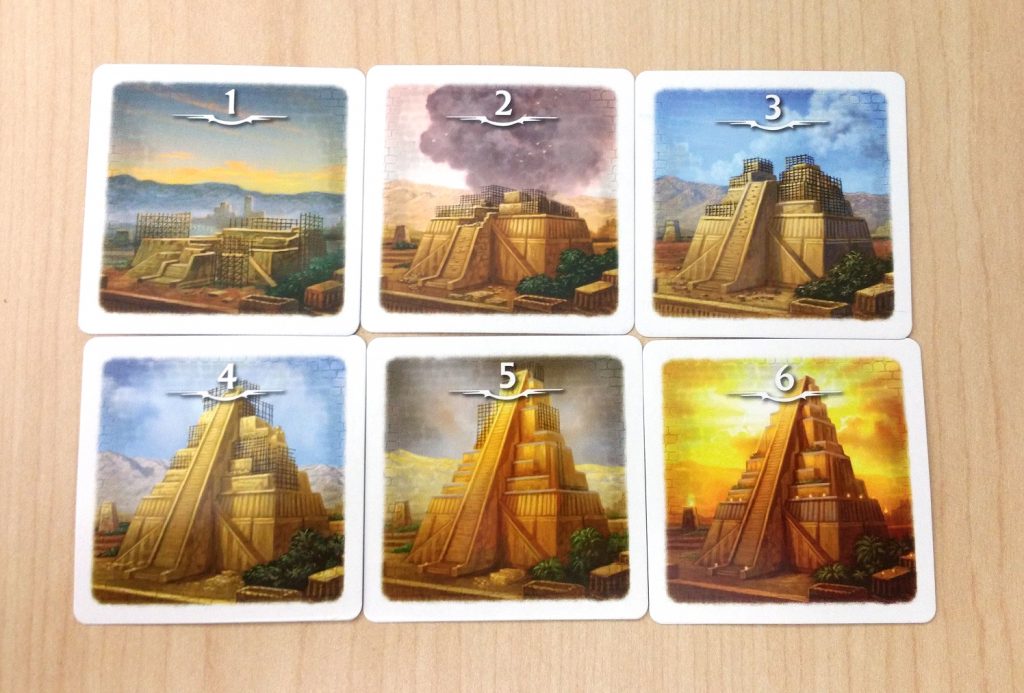
The Nation Cards
As I mentioned previously, there are five different types of Nation cards and each different nation has its own unique ability. These abilities come in two flavors – abilities that target Nation cards and abilities that target temples – and can only affect things at the same building site. Some of the terminologies may not mean much right now, but they will in due time. Here’s a list of the different nations and their abilities:
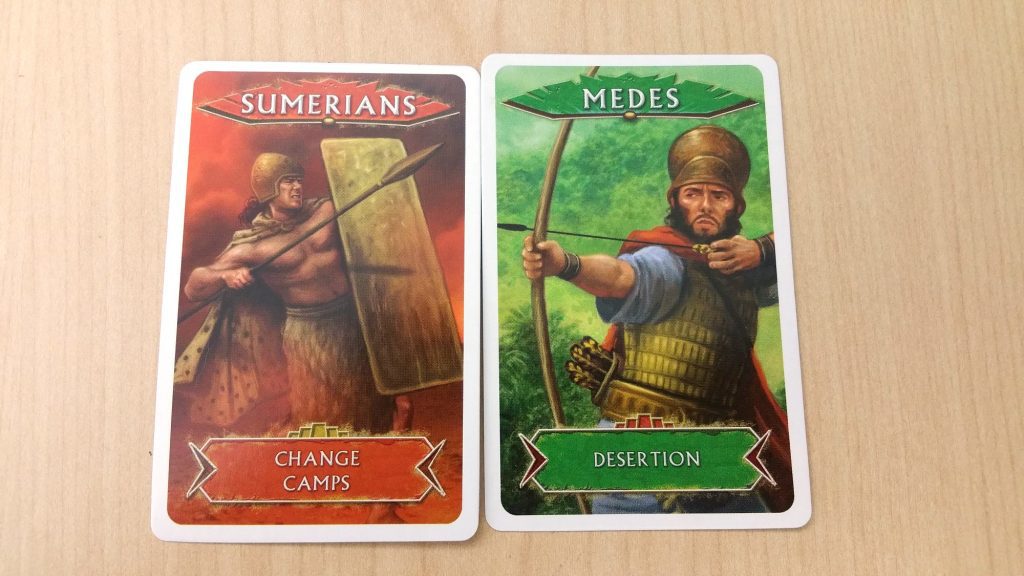
Medes (Desertion): Choose a nation. Your opponent must discard all Nation cards of this type found at the building site.
Sumerians (Change camps): All copies of the opponent’s most recently played nation card at this site move over to your side of the building site.
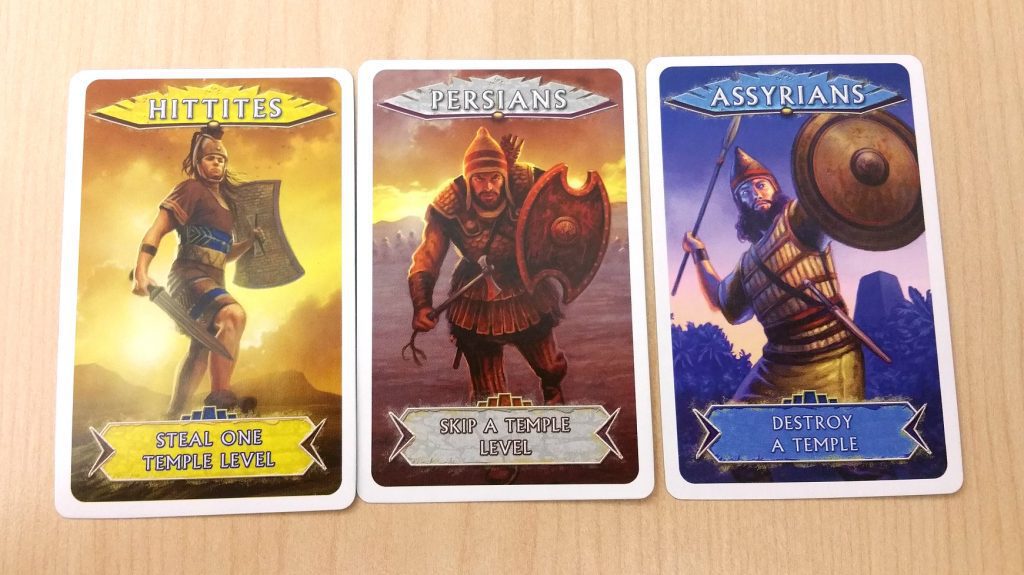
Assyrians (Destroy a Temple): at this construction site, destroy your opponent’s temple in its entirety. The temple cards are added face down to the Temple card deck with the highest value placed first, the next highest placed second, etc.
Hittites (Steal a temple level): at this construction site, you may take the top Temple card off of your opponent’s temple and add it to your temple instead. However, you must have a number of Nation cards present at the building site to accommodate this new temple level when you begin taking this action.
Persians (Skip a temple level): at this construction site, you may skip a temple level. This means you can begin your temple at level 2, for instance, or skip from a level 4 temple directly to a level 6. However, you must have a number of Nation cards present at the building site to accommodate this new temple level when you begin taking this action.
Anatomy of a Turn
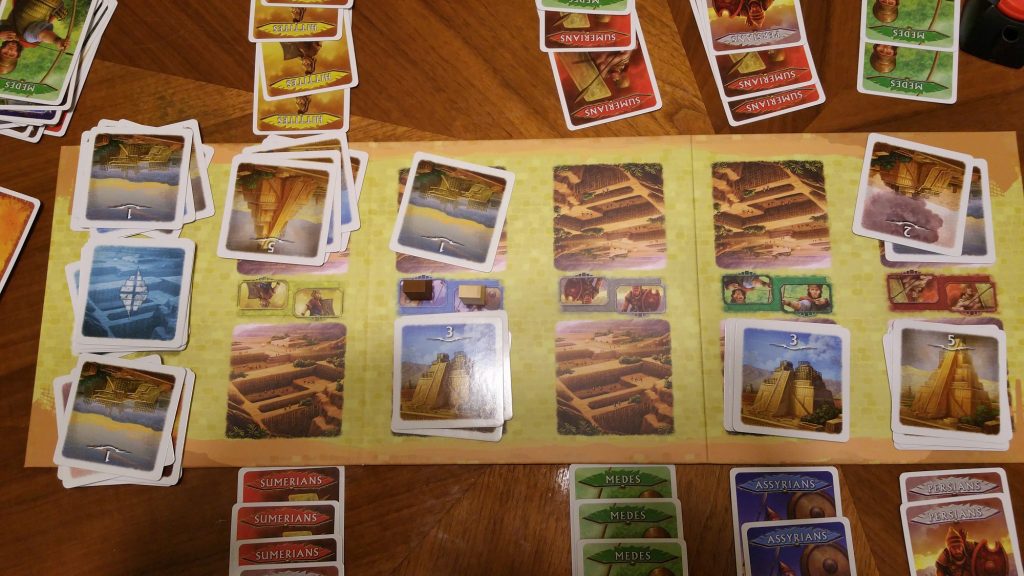
On a player’s turn, they will first draw 3 cards from the Nation deck and add them to their hand. Then they will perform any of the following actions in any order that they choose and as often as they like as long as they can legally perform the action:
- Move a building pawn: each building site has two spots for building pawns to be placed upon. One spot sort of points towards you while the other points at your opponent. To move your building pawn to a specific site, then you must first discard a card whose color corresponds to the color of the target site. For instance, moving your pawn to the blue site would require you to first discard a blue card from your hand.
- Deploy Nation card: you may place any number of cards from your hand below the building site, but each new card must sit on top of the card in such a way that the card beneath it can be seen.
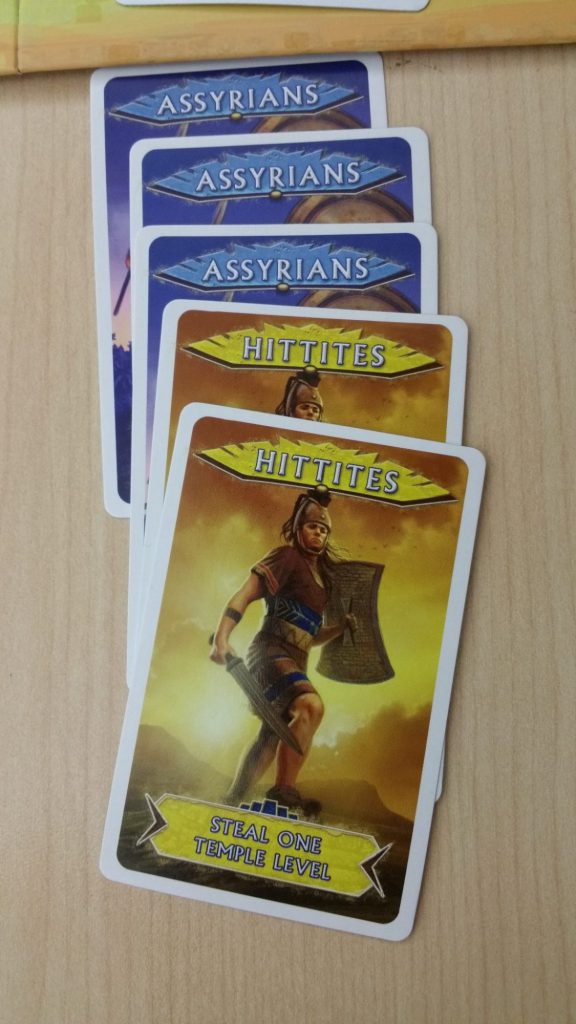
- Construct a temple: you may take a temple card from the top of either Temple card discard pile and place this card at your site. As I mentioned before, in order to do this, you must have a number of Nation cards at the site equal to or greater than the Temple card level present at the site and the temple levels must be built in the proper order.
- Use a Nation’s ability: in order to use a nation’s ability, there must be at least 3 of these cards clustered together in your tableau beneath the building site. They do not necessarily have to be the most recently played cards either. In the image above, for example, the player could choose to use the Assyrians ability if they so chose. To use the ability, the player will discard one of the cards from the cluster.
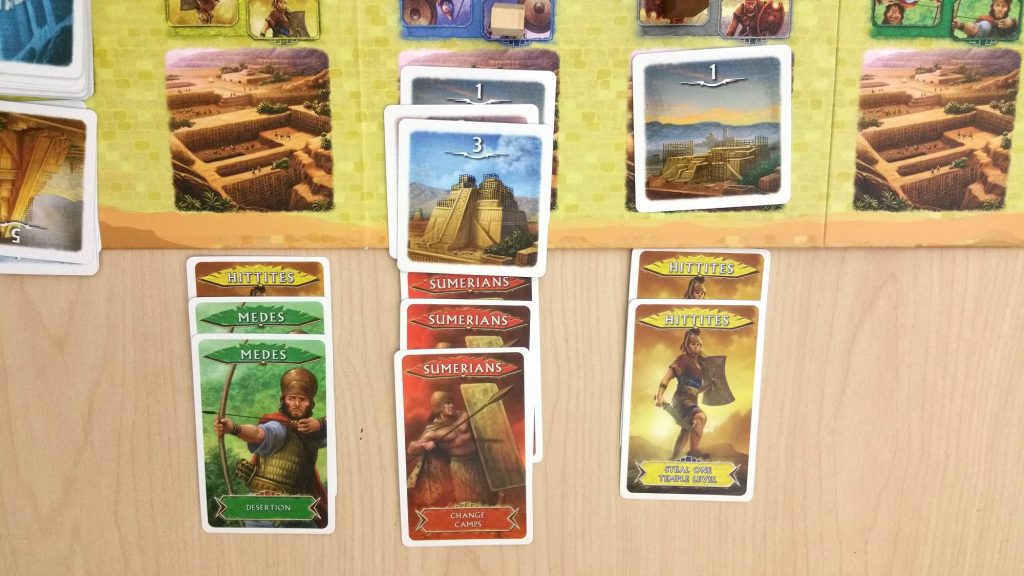
- Migrate: with the exception of the migrate action, your building pawn must always be present at whichever construction site at which you are manipulating cards. The migration action allows you to pick up the 3 most recently played cards from any of your building sites and then move those to any other building site. In the image above, for example, the player could move all 3 cards from the yellow site to the grey site. Doing so would create a Hittite cluster. Migration may only be performed once per turn.
- Discard half of your opponent’s hand: instead of using a nation’s special ability, you may discard one of the cards of a nation cluster and force your opponent to discard half of their hand rounded down. They select which cards to dispose of.
End of Turn and End of Game
At the end of a player’s turn, they will draw the top two cards of the Temple card deck and place them face up into the Temple card discard area on their side of the board making sure to place them so that the highest value is on top.

This progression of play continues until one player has at least 15 points worth of temple levels and their opponent has a combined value of 9 or less. If one player reaches a combined value of 15, but their opponent has exceeded 9 points, then the players will keep playing until either one player has reached a combined value of 20 or more or one player has reached a combined value of 9 or less. The game can also come to an end if the Temple card deck is exhausted, but I have personally never seen this end condition occur.
Thoughts
I’ve already commented on the component quality and told you what I thought about them. That being said, before I get into what I think about the gameplay, I’d like to take a moment to talk about Chris Quilliams’s artwork. While there isn’t a lot of artwork in the game overall, it’s very effectively done where it is. Each of the Nation cards shows a vastly different type of warrior caught in some epically heroic pose. Each of the Temple cards displays a large construction at various levels of completion. It even displays them at different times of the day. Instead of just rehashing a generic background, he has taken the time to create each instance of the temple’s construction as a separate, distinct entity. I really like that. This artwork’s pretty nice.
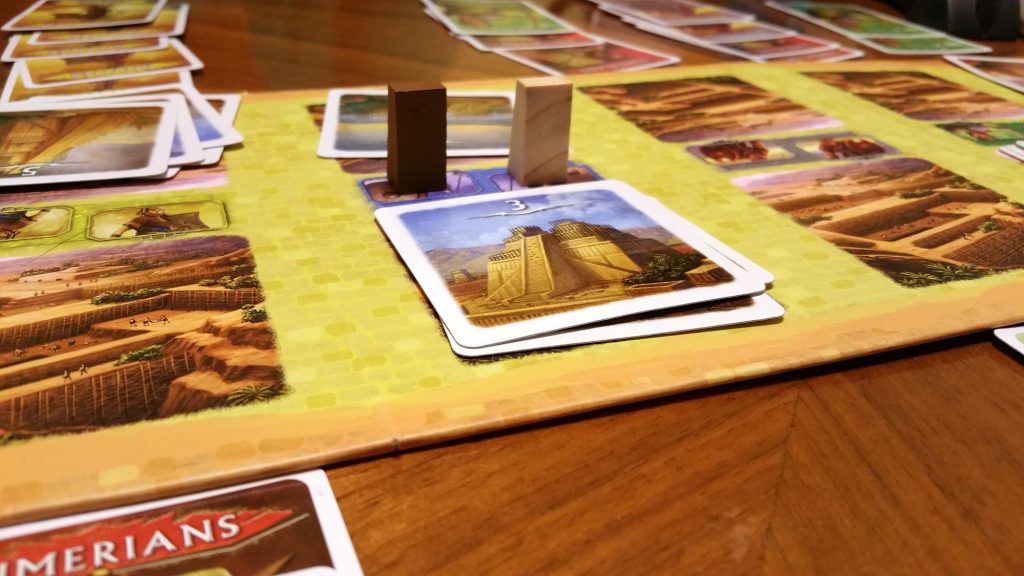
As for the gameplay, if I had to describe it in a single word, that word would be “ouch!”.
There are no bones about it. This is a brutal game. Babel is definitely a departure from anything else that Uwe Rosenberg has designed that I have ever encountered. Whereas his other games aren’t very interactive and very chill in nature, this game is the exact polar opposite. It’s a game with a vicious streak to it that forces the players into constant conflict. From attacking their temples outright to undermining their progress to forcing them to discard cards, it’s a game that is just as much about improving your own position as it is about destroying your opponent’s. This is not a friendly game by any means. I’ll be honest with you, if you’re the type of person that takes personal offense to what someone else does to you in a game, you’d be wise to avoid this one. And I really hate warning anyone away from an Uwe Rosenberg game since I am a massive fan of his. Still, I recognize that Babel has the power to potentially momentarily destroy friendships and I’d be remiss if I didn’t give you that warning.
That being said, if you don’t mind a healthy dose of direct player interaction, Babel is a phenomenal game. You don’t get a lot of cards each turn and deciding what to do with the cards that you do have is never an easy decision. Do you try to use all of the cards from your hand now or do you hang onto them for a future turn? Should you use your Nation card’s ability for its intended purpose or would nixing a few cards from your opponent’s hand be more beneficial? Which cards are the best to migrate and from where? Where’s the best place to move them to? It’s all of the little decisions that have huge impacts on the game outcome like these that keep things interesting.
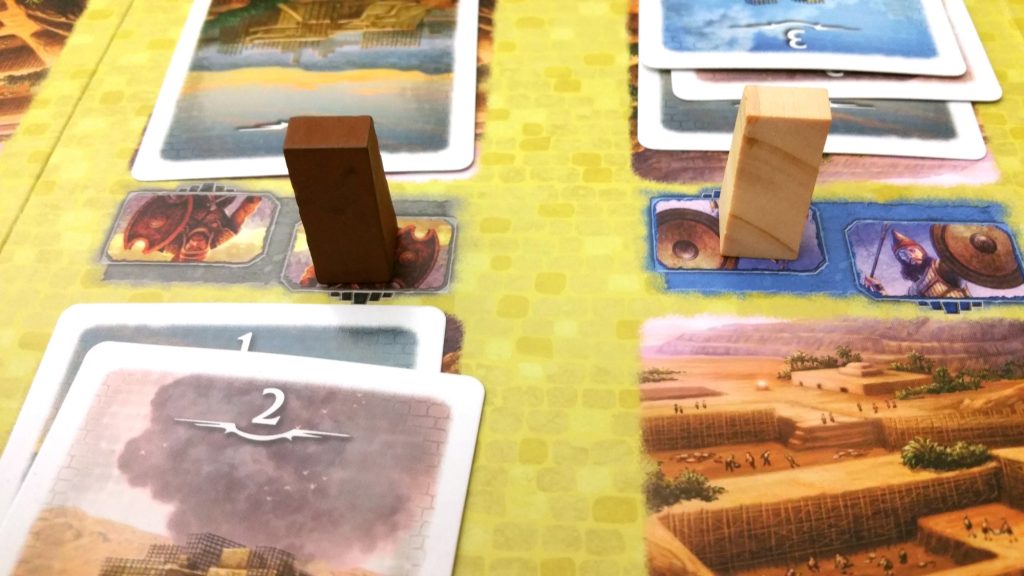
Uwe Rosenberg has a particular talent for cramming a lot of decision making into his games and that is no different here. There’s a lot going on and you’d be hard-pressed to ever feel disengaged from the experience and that’s important to me. When I play a game, I want to feel like I am playing the game as opposed to the game controlling me. Nothing is more boring than just going through a bunch of rote actions that are uninteresting and unimportant. Babel certainly doesn’t fit into that mold. It’s exciting and intense at every turn and it’s a stellar feeling when you’re able to pull off an amazing turn and pull out a win.
I’m not a great big fan of player conflict, but this game is a rare exception. Babel really gets my blood pumping and it keeps me on the edge of my seat at every turn. Despite my initial reticence about playing it, I’m glad that I did. I absolutely love this game! It’s so much fun!


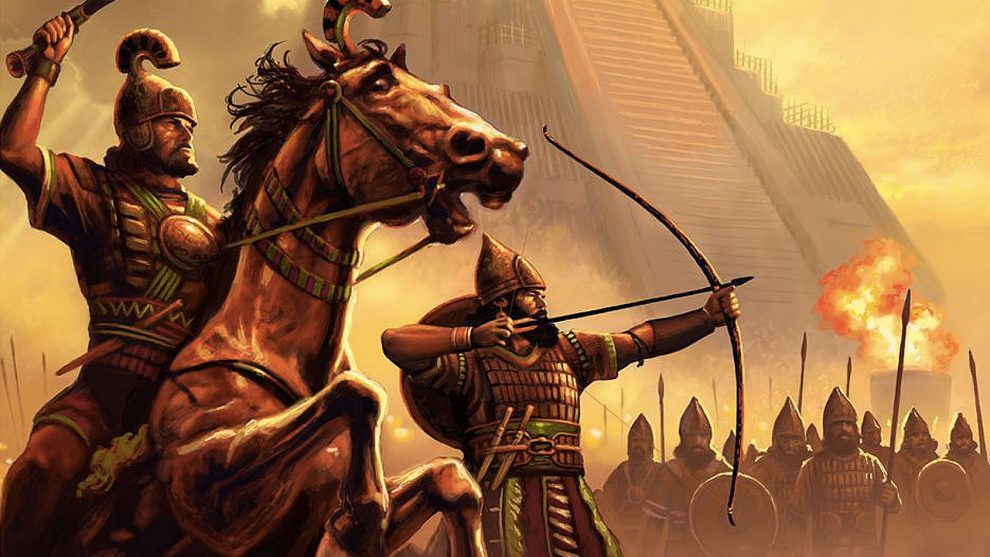








Add Comment